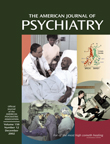To the Editor: In her review of
Handbook of Psychotherapy and Religious Diversity, Leslie M. Lothstein, Ph.D., A.B.P.P.
(1), illustrated how complex and controversial the subject of religion and spirituality can be when combined with the art and science of psychotherapy. Personal preferences abound and feelings can be intense, contributing to potential for misunderstandings among professionals and across disciplines. In order to combat any unnecessary confusion, I feel compelled to clarify the definitions of three terms Dr. Lothstein used in her review: religion, spirituality, and spiritualism.
The definition of “religion” has been actively debated by theologians since the early 1800s, when awareness of religions from more remote cultures grew, and the assumption of the centrality of dominant religions, such as Christianity, came into question. Religion is generally regarded as any system of belief regarding humankind’s relation to the divine, which includes practices of worship, sacred texts, and usually administrative and physical structures to promote the ongoing practice of the religion and member cohesion.
“Spirituality” is a term that has been used for centuries, and its meaning has evolved over the years. The term has been associated with the charisms of certain religious orders, such as the Carmelites or Franciscans of the Catholic Church or the Cabala of Jewish mysticism, and has represented the belief that an individual can be affected directly by a transcendent, divine spirit within the context of an established religious system. The experience of this spirit by the individual is facilitated by a disciplined life of prayer and, often, a spiritual guide. This leads to greater discernment about what path the individual should take to achieve enlightenment and union with God. There has been increased interest in spirituality over the past two decades, and the definition of this term has expanded to include experiences outside traditional religious settings. Nature-based spiritualities, such as Native American spirituality and eco-spirituality, are currently explored by individuals who feel alienated by the hierarchies of organized religion and feel reverence for the earth. The common thread in definitions of spirituality is the belief in a personal communion with what is holy through prayerful meditation and conscious living.
“Spiritualism” describes the belief that spirits of the dead can communicate with the living. Evidence of this belief system can be found in biblical times as well as in the Middle Ages, although modern spiritualism surfaced in the mid-1800s with the belief that mediums could connect individuals with deceased relatives. Spiritualism prospered during the 19th century as mediums conducted seances for individuals hoping to communicate with dead loved ones or hoping to find evidence of immortality. These longings were sometimes exploited, and cases of fraud were reported before the practice of spiritualism waned.
As we discuss the issues that religion and spirituality bring to the practice of psychotherapy, it is important to have some common understanding of the terms we use in this dialogue.

